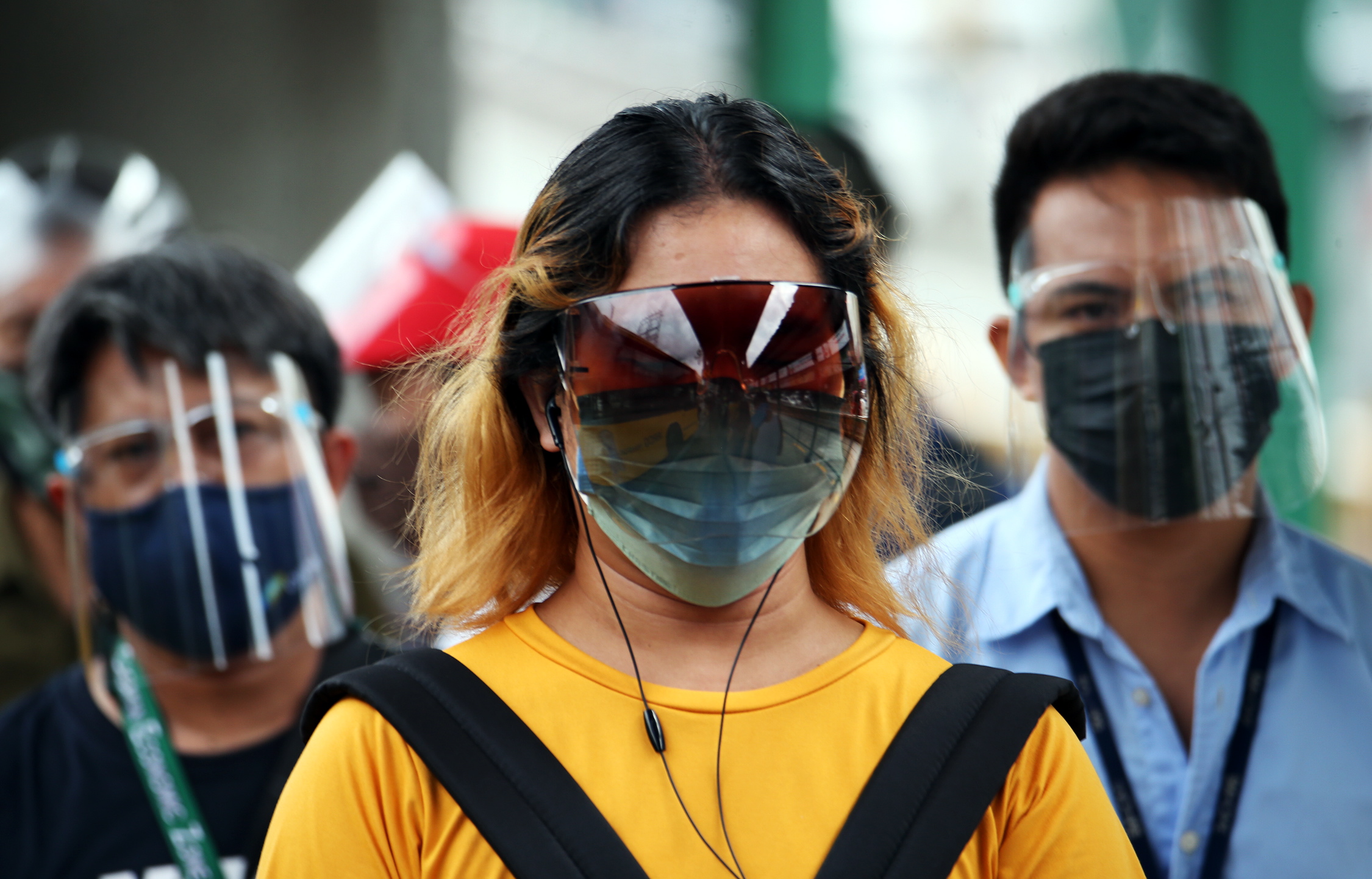Don’t throw away your face shields just yet

BRING ALONG Even after President Duterte allowed people not to wear face shields outdoors, they should still bring them along because the government requires their continued use in closed spaces, crowded areas and places where there are close contact activities. —NIÑO JESUS ORBETA
Don’t throw away those face shields yet, but find a way to still carry them with you.
Although President Duterte allowed people not to wear face shields outdoors, he still required their use in enclosed places, in crowded areas and during close-contact activities.
His decision to ease the face shield rules was welcomed on Thursday by Manila Mayor Francisco “Isko Moreno” Domagoso, one of the critics of the facial contraption which he said had dubious benefits.
Domagoso had openly criticized the face shield policy as an added expense that did not give people full protection from COVID-19, unless in an indoor setting like a hospital.
“Thank you, Mr. President. This will ease the people’s (expenses). I told you we will agree if you make sense,” the presidential aspirant said in an interview with CNN a day after Duterte announced the new rules on face shield use in his televised talk to the people.
Article continues after this advertisementExperts’ advice
The President on Wednesday night said he decided to heed the advice of experts from the government pandemic task force’s Technical Advisory Group to require the use of face shields only in places considered “high risk” such as indoor establishments, mass transportation, mass gatherings and outdoor or indoors activities that involved close contact among individuals.
Article continues after this advertisementSo that these places could be easily remembered he called them the “Three Cs”—closed spaces, crowded areas, and close contact activities.
“Outside of these three limitations, you are allowed not to use [face shields],” he said.
The Inter-Agency Task Force for the Management of Emerging Infectious Diseases (IATF), the government body managing the pandemic, required the use of face shields in all open and enclosed areas in December 2020.
The President said he wanted to scrap the policy but changed his mind when the Delta variant cases began rising in the Philippines.
“I got so scared that I ordered the reimposition of the face shields,” he said.
He explained that his concern was that “no matter how small the contributing factor” face shields had in avoiding contracting COVID-19, it was “okay” to use them.
Improve ventilation
Instead of requiring face shields, experts from the Health Professionals Alliance Against COVID-19 had been urging the government and business establishments to improve ventilation in enclosed areas and mass transportation.
Presidential spokesperson Harry Roque said the IATF was expected to list the specific areas and activities where the use of face shields would still be mandatory.
Roque said increasing the number of vaccinated Filipinos was also a factor in the policy of slightly relaxing the requirements in the use of face shields.
He said the threat from the Delta variant, which is now the dominant COVID-19 variant in the country, remained and that Filipinos should get vaccinated and continue observing minimum public health standards to stay safe.
Sales suddenly plunge
Face shield dealers observed an immediate drop in sales just a day after Duterte revised the government’s policy.
One of them, Cleofe Tolentino, told Radyo Inquirer that she had not made any sales when she was interviewed at midmorning on Thursday, when she would have already sold 3,000 pieces of the ubiquitous plastic face protection held in a frame that looks like half of an eyeglass.
She said that made an average sale of 5,000 pieces daily.
Tolentino, who sells them in bulk at P6.50 apiece, also expects the price to go down.
Before the most recent lockdown, she was selling them for the wholesale price of P10.00 each.
Tolentino hoped that many had not heard of the late night announcement and would buy from her.
P75 each last year
Another wholesaler, Rudy Dayag, said his price was even higher last year at P75.00.
He also was not optimistic of making big sales from now on.
“What could we do, it’s the President’s order,” Dayag said.
Amparo Francisco, who was haggling for a discount from the dealers, said she used to buy face shields for only P5.00 apiece and sold them for twice the price.
“We are expecting to lose an income source,” she said of the new policy.
For more news about the novel coronavirus click here.
What you need to know about Coronavirus.
For more information on COVID-19, call the DOH Hotline: (02) 86517800 local 1149/1150.
The Inquirer Foundation supports our healthcare frontliners and is still accepting cash donations to be deposited at Banco de Oro (BDO) current account #007960018860 or donate through PayMaya using this link.